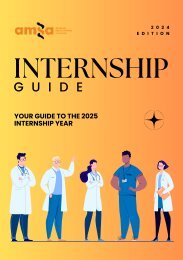AJGH Nexus - Volume 17 2023
AMSA Journal of Global Health (AJGH) 2023 Issue "Nexus"
AMSA Journal of Global Health (AJGH) 2023 Issue "Nexus"
Create successful ePaper yourself
Turn your PDF publications into a flip-book with our unique Google optimized e-Paper software.
CPR: A Universal Language<br />
Highlighting the challenges of inadequate CPR<br />
training in low and middle income countries<br />
By Raffaela Skourletos<br />
Peer reviewed by Dr Marilyn Wise<br />
As a final year medical student from<br />
Australia, I recently spent four weeks on an<br />
elective medical placement in the emergency<br />
department of a busy urban hospital in the<br />
capital city of Cambodia, Phnom Penh. It was<br />
a fascinating experience clinically, and an<br />
opportunity to sincerely connect with local<br />
students, doctors, and nurses – one I am<br />
deeply grateful for.<br />
The entrance to the hospital sits on a bustling<br />
city street, with the layered smells of grilling<br />
fish, petrol fumes and lingering Rumduol<br />
greeting me as I step out of the tuk tuk every<br />
morning. I am in a nation whose economy is<br />
the fastest growing in Asia but in which<br />
poverty still permeates life – including in the<br />
hospital in which I am working. I am<br />
reminded, constantly, of ways in which<br />
poverty influences the hospital care that<br />
patients receive and the care that staff can<br />
provide. Whether the patient is refusing<br />
diagnostic tests for cancer due to financial<br />
struggles or doctors must decide which<br />
patient can be attached to the single<br />
ventilator in the emergency department,<br />
resources are finite and often totally out of<br />
reach. This is the context for every lesson,<br />
every issue, and every observation I made<br />
here.<br />
The clinical acumen and knowledge of the<br />
local healthcare workers is remarkable, with<br />
resourcefulness and cost-effective<br />
judgement regarded as skills just as<br />
important as history-taking, examination,<br />
and diagnosis. The differences between<br />
Australian and Cambodian healthcare are<br />
sizable; the main being in the proportions of<br />
the populations who have ready access to<br />
high quality disease diagnostic testing and<br />
management. These differences reflect an<br />
enormous discrepancy in resources invested<br />
in the provision of health care to the<br />
populations in each country. No matter<br />
where you are in the world, resources are<br />
finite, and doctors must make decisions on<br />
their patients’ access to these resources.<br />
However, compared to Australia, this system<br />
is amplified in low- and middle-income<br />
countries where it is so obviously impacted<br />
by poverty.<br />
One of these differences was particularly<br />
striking. I experienced genuine shock when I<br />
realised that there was a difference in the<br />
delivery of what I had previously considered<br />
to be a universal technique for<br />
Cardiopulmonary Resuscitation (CPR). CPR is<br />
the process of performing chest<br />
compressions, maintaining an airway, and<br />
ventilating a patient who is in cardiac arrest<br />
to achieve a return of spontaneous<br />
circulation (ROSC). It can be a life-saving<br />
method when performed correctly and all<br />
Australian medical practitioners are required<br />
to learn CPR as part of their university<br />
studies and ongoing registration.<br />
In the hospital at which I was based in<br />
Cambodia, I witnessed several cardiac arrest<br />
resuscitations requiring CPR and Basic Life<br />
Support (BLS). The CPR technique involved a<br />
different depth and rate of chest<br />
compressions to the standard outlined by the<br />
Australian Resuscitation Council’s evidence-

















